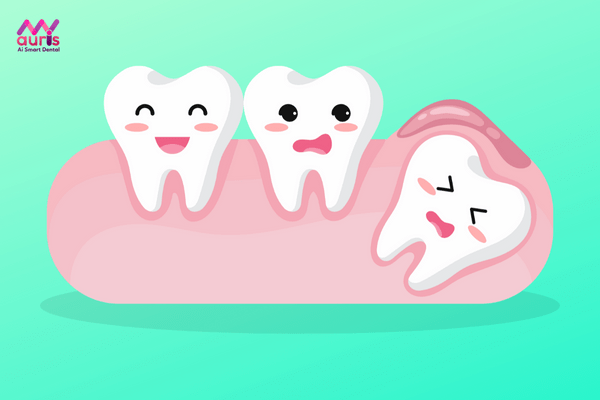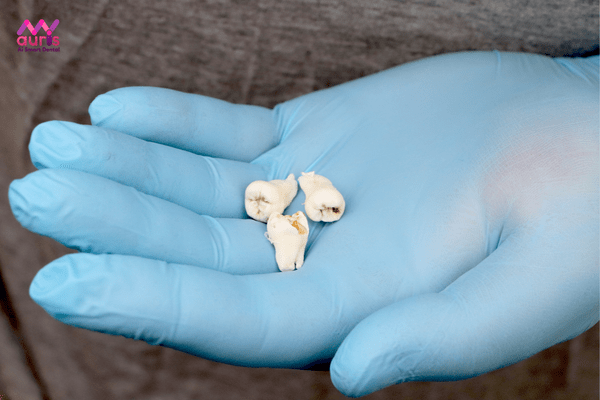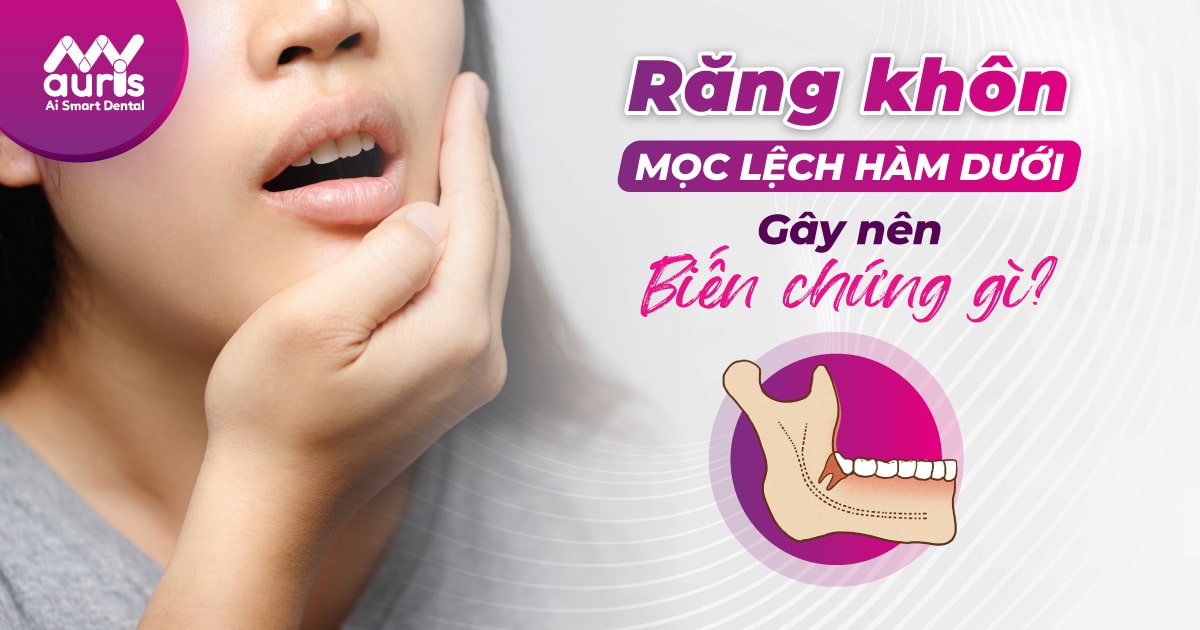The phobia of wisdom teeth always makes people worried. Because it not only causes pain but also tends to grow crookedly, causing many dangerous complications. Normally, when wisdom teeth grow, the jaw stops growing, so they are not crowded, grow crookedly, or grow obliquely, affecting oral health. To find out what complications misaligned lower jaw wisdom teeth cause, read the article below.
How do wisdom teeth grow crookedly in the lower jaw?
Wisdom teeth are also known as teeth number 8 or third molars. Wisdom teeth begin to grow when they reach adulthood from 17-25 years old. However, there are still cases where people grow earlier or later.
At this age, the jawbone becomes harder, stops growing in size, the mucosa and soft tissue become thicker… making it difficult for teeth to grow because there is no space left. Therefore, new wisdom teeth tend to grow crookedly and obliquely. In some cases, teeth cannot emerge from the gums, so they grow underground under the jawbone.

These things cause a lot of pain that affects eating and oral hygiene. At the same time, if not treated promptly, it will cause more dangerous complications.
Complications of impacted wisdom teeth in the lower jaw
Tooth decay
Tooth decay is a dental disease mouth often occurs, especially in locations that are difficult to clean. Wisdom teeth grow in the innermost corner of the jaw, making it difficult to observe and clean away plaque and food. Furthermore, teeth growing crookedly or obliquely will create space in the jaw or press on the teeth next to them, making it easy to trap food. These things create a favorable environment for tooth decay bacteria to grow. When a tooth is decayed, the cavity gradually increases in size, destroying tooth enamel as well as tooth structure. If not removed, it will damage the tooth pulp and spread to other teeth.
Gum diseases
The cause of gum disease is food and plaque accumulation at the roots of the teeth. In the long term, if not cleaned, it will cause inflammation, swelling and pain of the gums.
Bacterial infection, gingivitis
The most common complications are swelling, pain, and local infection. Wisdom teeth that cannot emerge are covered by the gums or grow underground in the jawbone, causing food and bacteria to get stuck in the gum pockets, causing gingivitis and acute periodontal inflammation. This condition can last long and affect neighboring teeth if not treated and corrected promptly.

Cyst
If wisdom teeth impacted in the lower jaw, if not treated promptly, can cause jaw bone cysts In some cases, the jawbone, teeth as well as nerves will have to be removed, causing serious damage to oral health.
Reflex and sensory disorders
The lower jaw wisdom teeth have many nerves passing through them and controlling sensation. If the wisdom teeth grow crookedly in the lower jaw, it will cause compression of these nerves Lips, skin, mucous membranes, possibly teeth in half of the jaw are also affected.
In addition, wisdom teeth also cause sympathetic syndrome: pain, swelling on one side of the face,… to grow and accidentally push other teeth around. This compression causes the surrounding teeth to be affected, especially the 7th molar. From there, it causes the teeth to become misaligned and cause loss of aesthetics. And this is also one of the signs of wisdom teeth growing crookedly in the lower jaw. However, when wisdom teeth grow, this condition is very common. Firstly, wisdom teeth are difficult to clean, secondly, food and plaque accumulate around the teeth, thus causing bad breath.
When should wisdom teeth impacted in the lower jaw be extracted?
Wisdom teeth impacted in the lower jaw cause serious problems, so doctors often prescribe removal to correct the current situation as well as protect the teeth and good oral health. more. However, when teeth grow straight like permanent teeth in the jaw, without causing complications, without growing obliquely or crookedly and without causing intrusion, people will not need to have their teeth extracted.

Therefore, below are some cases where wisdom teeth impacted in the lower jaw should be extracted:
- Wisdom teeth grow crooked and impacted, causing pain, followed by inflammation and swelling in the gums
- Răng khôn bị sâu, làm shifting other teeth, crowding each other,…
- Misaligned wisdom teeth hinder oral hygiene and interfere with chewing
- Wisdom tooth extraction according to the requirements of orthodontics and aesthetic restoration
Normally, doctors will recommend wisdom teeth extraction to minimize future complications. When extracting wisdom teeth, the doctor must take an X-ray to check the situation of the tooth: how misaligned the tooth is, whether it has fully grown, whether it is penetrating tooth number 7 or whether it is rubbing against the inner lining of the cheek, etc.
From the results of the examination, the doctor can make a judgment and the most appropriate direction for tooth extraction. As you know, wisdom teeth are located in a quite “sensitive” position due to many nerves passing through them, so tooth extraction is also quite complicated. Therefore, everyone should choose a reputable, quality dentistry, a team of doctors with expertise, techniques, and many years of experience, modern machinery and equipment, tools, and a sterilized clinic that meets sterile conditions before, during, and after the tooth extraction process.
What to do after extracting impacted wisdom teeth in the lower jaw?
After extracting impacted wisdom teeth in the lower jaw, to avoid complications as well as to allow the wound to recover quickly, everyone should pay attention note:
- Bite firmly on the gauze pad for 20 minutes to stop the bleeding. Do not hold it for too long because it can cause water contamination. You should also not be extracted too early because wisdom teeth are very difficult to stop bleeding.
- Apply ice immediately after extraction, during the first day to reduce pain and swelling
- Take painkillers as prescribed by your doctor, do not buy them outside
- After 24-48 hours, gentle oral hygiene must be performed. Avoid brushing hard on unhealed wounds, combine mouthwash with salt water to clean bacteria, plaque and fight inflammation for quick wound recovery
- You should supplement proper nutrition after tooth extraction to help the body regain strength quickly. In addition, you should not eat hard, chewy foods but should supplement with soft, liquid foods that are easy to swallow. Limit acidic, spicy, hot foods as well as stimulants because they cause slow wound healing.

Hopefully the information in the article shared by My Auris dentistry helps everyone gain some knowledge about wisdom teeth grow crookedly in the lower jaw. From there, help people have effective measures to handle complications to bring the best oral health.
Anh Thy





